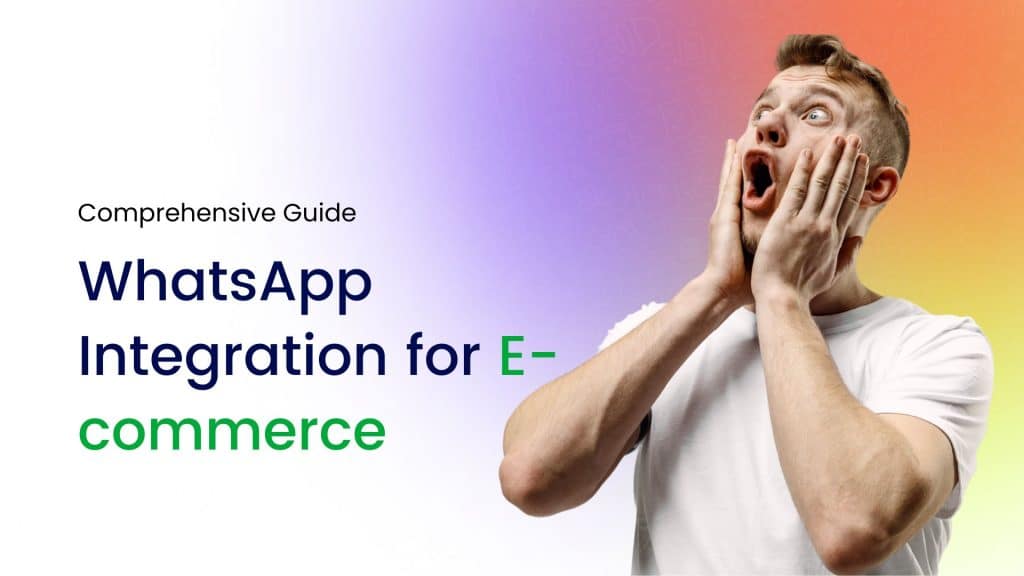In today’s digital age, effective communication is the cornerstone of successful e-commerce businesses. With the ever-growing competition, companies are continually exploring innovative ways to engage with their customers and streamline their purchasing journey. One such method that has gained significant traction is the integration of WhatsApp into e-commerce platforms. Leveraging the ubiquitous messaging app can not only enhance customer service but also boost sales and foster better engagement. Let’s delve into the benefits and strategies of WhatsApp integration for e-commerce.
The Power of WhatsApp in E-commerce
WhatsApp, with its extensive user base exceeding billions worldwide, presents a vast opportunity for e-commerce businesses to connect with their customers on a personal level. Its simplicity, ease of use, and instantaneous nature make it an ideal platform for quick queries, customer support, and even direct selling. By integrating WhatsApp into their e-commerce operations, businesses can tap into a channel that customers are already familiar with and comfortable using.
Benefits of WhatsApp Integration
Instant Customer Support:
WhatsApp provides a real-time communication channel, allowing businesses to offer immediate assistance to customers. Whether it’s resolving queries, providing product information, or addressing concerns, the instant nature of WhatsApp ensures prompt responses, leading to enhanced customer satisfaction.
Personalized Interaction:
Through WhatsApp, businesses can establish a more personalized connection with their customers. By engaging in one-on-one conversations, companies can tailor their communication to suit individual preferences, recommend products based on past purchases, and even send personalized offers or discounts, thereby increasing customer loyalty.
Seamless Shopping Experience:
WhatsApp integration enables businesses to streamline the purchasing process for customers. From browsing products to placing orders and receiving updates on delivery status, all can be seamlessly managed within the messaging app. This convenience enhances the overall shopping experience, leading to higher conversion rates and repeat purchases.
Proactive Marketing:
Beyond customer service, WhatsApp serves as a powerful marketing tool for e-commerce businesses. Companies can send out targeted promotions, product updates, and exclusive deals directly to customers’ WhatsApp chats. With the ability to create broadcast lists or targeted groups, businesses can reach out to segmented audiences, increasing the effectiveness of their marketing campaigns.
Order Notifications and Updates:
WhatsApp integration allows businesses to send automated order notifications and updates to customers. From order confirmation and payment reminders to shipping alerts and delivery confirmations, these real-time updates keep customers informed every step of the way, reducing uncertainty and fostering trust in the brand.
Strategies for Effective WhatsApp Integration
Opt-In Mechanism:
Respect customers’ privacy by implementing an opt-in mechanism for WhatsApp communication. Allow customers to voluntarily subscribe to receive updates and notifications, ensuring compliance with privacy regulations and building trust with your audience.
Personalization:
Tailor your messages and interactions to each customer’s preferences and purchasing history. Use data analytics to segment your audience and send personalized recommendations, offers, and updates, creating a more engaging and relevant experience for your customers.
Automated Responses:
Utilize chatbots and automated responses to handle frequently asked questions and basic customer inquiries. By automating routine tasks, you can free up your support team to focus on more complex issues while still providing timely assistance to customers.
Multi-Channel Integration:
Integrate WhatsApp with other communication channels, such as email, SMS, and social media, to create a cohesive omnichannel experience for your customers. Ensure consistency in messaging and branding across all channels to maintain a unified brand identity.
Measure and Analyze Performance:
Track key metrics such as response time, customer satisfaction ratings, and conversion rates to gauge the effectiveness of your WhatsApp integration. Use this data to identify areas for improvement and optimize your communication strategy accordingly.
Importance of Customer Engagement in E-commerce
The Vital Role of Customer Engagement in E-commerce Success
In the ever-evolving landscape of e-commerce, where competition is fierce and consumer choices abundant, one factor stands out as a critical determinant of success: customer engagement. It’s no longer sufficient for online retailers to simply offer quality products or competitive prices. Instead, they must actively cultivate relationships with their customers, fostering meaningful interactions that go beyond mere transactions. Here, we delve into the importance of customer engagement in e-commerce and how it drives business growth and sustainability.
Building Trust and Loyalty
In the virtual realm of e-commerce, trust is the currency of success. Establishing trust with customers is paramount, as it fosters loyalty and encourages repeat business. Effective customer engagement strategies play a pivotal role in building this trust by providing personalized experiences, timely support, and transparent communication.
Engagement initiatives such as targeted email campaigns, social media interactions, and personalized recommendations demonstrate to customers that their preferences and needs are valued. By delivering relevant content and offers tailored to individual interests, e-commerce businesses can deepen their connection with customers, thereby increasing loyalty and driving long-term retention.
Enhancing Customer Satisfaction
Customer satisfaction lies at the heart of every successful e-commerce venture. Satisfied customers are more likely to become brand advocates, spreading positive word-of-mouth and driving referrals. Moreover, happy customers tend to spend more and make repeat purchases, contributing to increased revenue and profitability.
Effective customer engagement goes beyond the point of sale, encompassing every touchpoint along the customer journey. Whether it’s providing prompt assistance through live chat, soliciting feedback to improve products and services, or offering seamless returns and exchanges, e-commerce businesses can enhance customer satisfaction by prioritizing engagement and responsiveness.
Driving Sales and Revenue Growth
Engaged customers are not only more loyal and satisfied but also more likely to spend more money. Studies consistently show that engaged customers contribute significantly higher revenue and lifetime value compared to passive or disengaged counterparts. By actively engaging with customers and nurturing relationships over time, e-commerce businesses can drive incremental sales and revenue growth.
Personalized recommendations based on past purchase history, exclusive offers for loyal customers, and targeted promotions tailored to specific segments can all incentivize purchasing behavior and increase average order value. Moreover, engaged customers are more receptive to upselling and cross-selling efforts, further boosting sales and profitability.
Gaining Competitive Advantage
In a crowded e-commerce marketplace, differentiation is key to standing out from the competition. While product quality and pricing will always be important factors, customer engagement can serve as a powerful differentiator that sets businesses apart.
E-commerce companies that prioritize customer engagement demonstrate a commitment to customer satisfaction and value creation beyond the transactional level. By delivering exceptional experiences and fostering genuine connections with customers, these businesses can carve out a unique position in the market, attracting and retaining customers in the face of stiff competition.
Improving Sales with WhatsApp Integration
In the fast-paced world of e-commerce, businesses are continually seeking innovative ways to drive sales and enhance customer engagement. One strategy gaining momentum is the integration of WhatsApp into e-commerce platforms. With its widespread popularity and robust messaging capabilities, WhatsApp presents a unique opportunity for businesses to connect with customers in real-time and drive conversions. In this article, we’ll explore how integrating WhatsApp can improve sales for e-commerce businesses.
Real-Time Customer Engagement
WhatsApp integration enables businesses to engage with customers in real-time, providing instant support and assistance throughout the purchasing journey. Whether it’s answering product inquiries, addressing concerns, or providing personalized recommendations, the ability to communicate directly with customers via WhatsApp enhances the overall shopping experience and increases the likelihood of conversion.
Personalized Product Recommendations
By leveraging customer data and preferences, businesses can use WhatsApp to deliver personalized product recommendations to individual customers. Whether through targeted messages or interactive product catalogs, businesses can tailor their offerings to match each customer’s interests and purchasing behavior, thereby increasing the likelihood of making a sale.
Seamless Transaction Experience
WhatsApp integration streamlines the purchasing process by allowing customers to browse products, place orders, and make payments directly within the messaging app. By integrating features such as product catalogs, shopping carts, and secure payment gateways, businesses can reduce friction in the buying process and provide a seamless transaction experience, ultimately leading to higher conversion rates.
Exclusive Promotions and Deals
WhatsApp provides businesses with a direct channel to communicate exclusive promotions, deals, and discounts to customers. By creating targeted marketing campaigns and offering special incentives to WhatsApp subscribers, businesses can drive sales and encourage repeat purchases while fostering a sense of exclusivity and loyalty among customers.
Proactive Customer Support
With WhatsApp integration, businesses can proactively reach out to customers to offer assistance or address any issues that may arise. By providing proactive customer support, businesses can ensure a smooth shopping experience for customers, mitigate potential obstacles to conversion, and build trust and loyalty over time.
Data-Driven Insights
WhatsApp integration allows businesses to track customer interactions, analyze data, and gain valuable insights into customer behavior and preferences. By leveraging this data, businesses can optimize their marketing strategies, refine their product offerings, and identify new opportunities to drive sales and maximize revenue.
Strategies for Success
- Provide Excellent Customer Service: Offer prompt and personalized assistance to customers via WhatsApp to enhance their shopping experience and increase satisfaction.
- Segment Your Audience: Segment your customer base and tailor your WhatsApp messages and promotions based on demographics, interests, and purchasing behavior to maximize relevance and effectiveness.
- Offer Exclusive Deals: Use WhatsApp to communicate exclusive promotions, deals, and discounts to subscribers, incentivizing purchases and driving sales.
- Optimize for Mobile: Ensure that your e-commerce platform and WhatsApp integration are optimized for mobile devices to provide a seamless and convenient shopping experience for customers.
- Track and Analyze Performance: Monitor key metrics such as engagement rates, conversion rates, and customer feedback to measure the effectiveness of your WhatsApp integration and make data-driven adjustments as needed.
Conclusion
WhatsApp integration offers e-commerce businesses a valuable opportunity to enhance customer engagement, streamline operations, and drive sales. By leveraging the power of real-time communication, personalization, and proactive marketing, companies can create a seamless shopping experience that fosters loyalty and satisfaction among their customer base. Embracing WhatsApp as a strategic communication channel can undoubtedly propel e-commerce businesses to new heights in the digital landscape.
In the dynamic world of e-commerce, where consumer preferences and behaviors are constantly evolving, customer engagement emerges as a linchpin for success. By prioritizing engagement initiatives that build trust, enhance satisfaction, drive sales, and differentiate from competitors, e-commerce businesses can position themselves for sustained growth and profitability in an increasingly competitive landscape. In essence, the importance of customer engagement cannot be overstated—it’s the cornerstone upon which e-commerce success is built.







